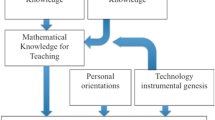Abstract
To illustrate aspects of critical mathematics education a project involving 14–15 years old students is described. Mathematics education can be organized so as to develop different types of knowing: mathematical knowing, which can be associated with skills developed in traditional teaching; technological knowing, which can be associated with a competence in mathematical model building; and reflective knowing, which can be seen as a competence in evaluating applications of mathematics. The thesis discussed says that if mathemacy should be developed as a competence of importance in a critical education, it must integrate mathematical, technological as well as reflective knowing. Via the description of the project, a possible educational meaning is given to this thesis. Especially, it is discussed what it could mean to involve students in reflections about mathematics as a tool for technological design.
Similar content being viewed by others
References
Abraham, J. and Bibby, N.: 1988, “Mathematics and society: ethnomathematics and a public educator curriculum,For the Learning of Mathematics 8(2), 2–11.
Adorno, T. W.: 1971,Erziehung zur M ündigkeit, Suhrkamp, Frankfurt am Main.
Benhabib, S.: 1986,Critique, Norm, and Utopia: A Study of the Foundations of Critical Theory, Columbia University Press, New York.
Beth, E. W. and Piaget, J.: 1966,Mathematics, Epistemology and Psychology, Reidel Publishing Company, Dordrecht.
Boos-Bavnbek, B. and Pate, G.: 1989, “ Information technology and mathematical modelling, the software crisis and educational consequences”,Zentralblatt für Didaktik der Mathematik 89(5), 167–175.
Borba, M.: 1990, “Ethnomathematics and education”,For the Learning of Mathematics 10 (1), 39–43.
Connerton, P.: 1980,The Tragedy of Enlightenment, Cambridge University Press, Cambridge.
D'Ambrosio, U.: 1980, “Mathematics and society: Some historical considerations pedagogical implications”,International Journal of Mathematical Education in Science and Technology 11, 479–488.
D'Ambrosio, U.: 1981, “Uniting reality and action: A Holistic approach to mathematics education”, in L. A. Steen and D. J. Albers (eds.),Teaching Teachers, Teaching Students, Birkhäuser, Boston/Basel/Stuttgart, pp. 33–42.
D'Ambrosio, U.: 1985, “Mathematics education in a cultural setting”,International Journal of Mathematical Education in Science and Technology 16, 469–477.
Davis, P. J.: 1989, “Applied mathematics as social contract”, in C. Keitel et al. (eds.), 1989, pp. 24–27.
Davis, P. J. and R. Hersh: 1988,Descartes' Dream: The World According to Mathematics, Penguin Books, London.
Ellul, J.: 1964,The Technological Society, Random House, New York.
Ernest, P.: 1991,The Philosophy of Mathematics Education, The Falmer Press, London.
Frankenstein, M.: 1987, “Critical mathematics education: An application of Paulo Freire's epistemology”, in Ira Shor (ed.),Freire for the Classroom, Heinemann, London, pp. 180–210.
Frankenstein, M.: 1989,Relearning Mathematics, Free Association Books, London.
Freire, P.: 1972,Pedagogy of the Oppressed, Herder and Herder, New York.
Freire, P.: 1974,Cultural Action for Freedom, Penguin Books, London.
Freudenthal, H.: 1991,Revisiting Mathematics Education: China Lectures, Kluwer Academic Publishers, Dordrecht.
Gagatsis, A. and Patronis, T.: 1990, “ Using geometrical models in a process of reflective thinking in learning and teaching mathematics”,Educational Studies in Mathematics 21, 29–54.
Giroux, H. A.: 1989,Schooling for Democracy: Critical Pedagogy in the Modern Age, Routledge, London.
Held, D.: 1980,Introduction to Critical Theory, Hutchinson, London.
Illeris, K.: 1974,Problemorientering og deltagerstyring, Munksgaard, Copenhagen.
Jay, M.: 1973,The Dialectical Imagination: A History of the Frankfurt School and the Institute of Social research 1923–50, Heinemann, London.
Keitel, C.: 1989, “Mathematics and technology ”,For the Learning of Mathematics 9, 7–13.
Keitel, C. et al. (eds.): 1989,Mathematics, Education and Society, UNESCO, Division of Science, Technical and Environmental Education, Paris.
Keitel, C, Kotzmann, E. and Skovsmose, O.: 1992, “Beyond the tunnel vision”, Preprint Reihe Mathematik, No. 2, Technische Universität Berlin.
Kellner, D.: 1989,Critical Theory, Marxism and Modernity, Polity Press, Cambridge.
Kitcher, P.: 1984,The Nature of Mathematical Knowledge, Oxford University Press, Oxford.
Livingstone, D. W. (ed.): 1987,Critical Pedagogy and Cultural Power, Bergin and Garvey, New York.
Mellin-Olsen, S.: 1987,The Politics of Mathematics Education, Reidel Publishing Company, Dordrecht.
Münzinger, W. (ed.): 1977,Projektorientierter Mathematikunterricht, Urban und Schwarzenberg, München.
Negt, O.: 1965,Soziologische Phantasie und exemplarisches Lernen, Europäische Verlagsanstalt, Frankfurt am Main.
Niss, M.: 1977, “The ‘crises’ in mathematics instruction and a new teacher education at grammer school level”,International Journal of Mathematical Education in Science and Technology 8, 303–321.
Niss, M.: 1983, “Considerations and experiences concerning integrated courses in mathematics and other subjects”, in M. Zweng et al. (eds.),Proceedings of the Fourth International Congress on Mathematical Education, Birkhäuser, pp. 247–249.
Niss, M.: 1985, “Applications and modelling in the mathematics curriculum — State and trends”,International Journal for Mathematical Education in Science and Technology 18, 487–505.
Niss, M.: 1989, “Aims and scope of applications and modelling in mathematics curicula”, in W. Blum et al. (eds.),Applications and Modelling in Learning and Teaching Mathematics, Ellis Horwood, Chichester, pp. 22–31.
Paffrath, F. H. (ed.): 1987,Kritische Theorie und Pädagogik der Gegenwart, Deutscher Studien Verlag, Weinheim.
Piaget, J.: 1970,Genetic Epistemology, Columbia University Press, New York.
Skovsmose, O.: 1980,Forandringer i Matematikundervisningen, Gyldendal, Copenhagen.
Skovsmose, O.: 1981a,Matematikundervisning og Kritisk Pcedagogik, Gyldendal, Copenhagen.
Skovsmose, O.: 1981b,Alternativer og Matematikundervisning, Gyldendal, Copenhagen.
Skovsmose, O.: 1984,Kritik, Undervisning og Matematik, Lærerforeningernes Materialeudvalg, Copenhagen.
Skovsmose, O.: 1985, “Mathematical education versus critical education”,Educational Studies in Mathematics 16, 337–354.
Skovsmose, O.: 1988, “Mathematics as part of technology”,Educational Studies in Mathematics 19, 23–41.
Skovsmose, O.: 1989a, “Towards a philosophy of an applied oriented mathematical education”, in W. Blum et al. (eds.),Applications and Modelling in Learning and Teaching Mathematics, Ellis Horwood, Chichester, pp. 110–114.
Skovsmose, O.: 1989b, “Models and reflective knowledge”,Zentralblatt für Didaktik der Mathematik 89(1), 3–8.
Skovsmose, O.: 1990a, “Mathematical education and democracy”,Educational Studies in Mathematics 21, 109–128.
Skovsmose, O.: 1990b, “Reflective knowledge: Its relation to the mathematical modelling process”,International Journal of Mathematical Education in Science and Technology 21, 765–779.
Skovsmose, O.: 1992, “Democratic competence and reflective knowing”,For the Learning of Mathematics 12(2), 2–11.
Volk, D.: 1975, “Plädoyer für einen problemorientierten Mathematikunterricht in emanzipatorischer Absicht”, in Michael Ewers (ed.),Naturwissenschaftliche Didaktik zwischen Kritik und Konstruktion, Belz Verlag, Weinheim, pp. 203–234.
Volk, D. (ed.): 1979,Kritische Stichw örter zum Mathematikunterricht, Wilhelm Fink Verlag, München.
Young R.: 1989,A Critical Theory of Education, Havester Wheatsheaf, New York.
Author information
Authors and Affiliations
Rights and permissions
About this article
Cite this article
Skovsmose, O. Towards a critical mathematics education. Educ Stud Math 27, 35–57 (1994). https://doi.org/10.1007/BF01284527
Issue Date:
DOI: https://doi.org/10.1007/BF01284527




